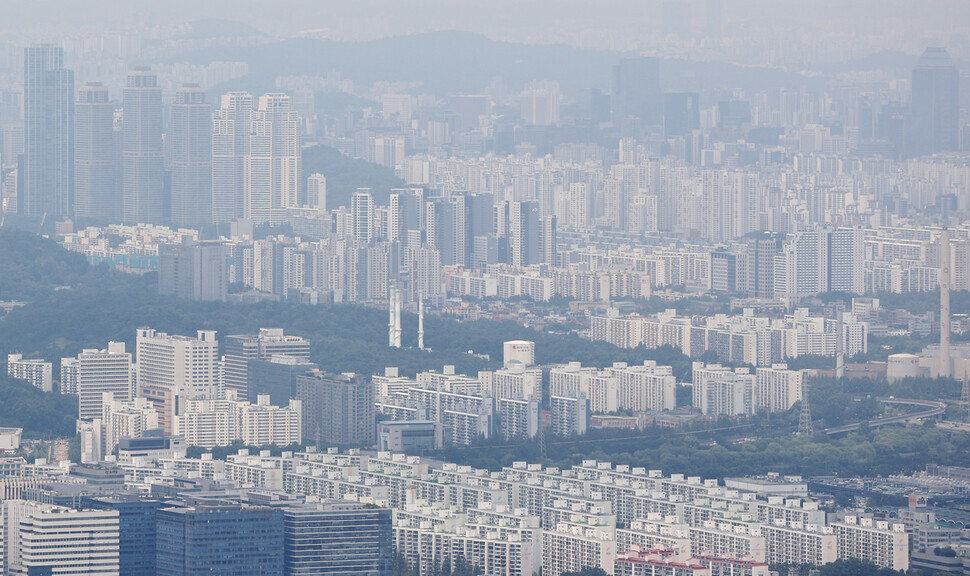hankyoreh
Links to other country sites 다른 나라 사이트 링크
[Editorial] Bank of Korea warns against housing bubble before rate hike

The Bank of Korea (BOK) is quickly preparing to raise the base interest rate, which it has kept at the lowest level in history in response to the economic downturn caused by the COVID-19 pandemic. An interest rate hike will make it harder for households that have taken out big mortgages to keep up with interest payments.
The BOK raised eyebrows with its remark that “the downside risk of housing prices has been gradually increasing since the first quarter of 2020.” Although warnings about a real estate bubble have been sounded in several sectors, it’s particularly needful to heed such a warning when it comes from the central bank, which decides the country’s monetary policy.
According to the BOK’s financial stability report for the first half of the year, published on Tuesday, household debt has increased at a very rapid clip even during the COVID-19 crisis. Household debt stood at 1,765 trillion won (US$1.56 trillion) at the end of the first quarter of this year, representing a big 9.5% increase year on year.
Household debt as a percentage of disposable income rose a striking 11.4 points over the same period, from 160.1% to 171.5%.
An analysis by the Korea Institute of Finance found that Korea’s household debt was at the highest level in the world, both in terms of the amount of debt and the rate of its increase.
BOK Governor Lee Ju-yeol signaled a change of monetary policy on June 11, as the BOK’s worries about the side effects of ultra-low interest rates shift from inflation to the growth of household debt.
The increase in household debt is being driven by home mortgages — loans given to homebuyers, who use their property as collateral. Despite a string of measures taken by the government, the spike in housing prices in the greater Seoul area shows no signs of slowing.
Figures provided by the Korea Real Estate Board showed that apartment prices in Seoul rose by 0.12% last week, the biggest jump in 18 months.
Higher housing prices are a psychological factor driving housing purchases, creating a vicious cycle.
Given long-term trends and the profitability index — that is, housing prices as a percentage of household income — the BOK said, real estate in and around Seoul is likely overpriced.
When the BOK analyzed the downside risk of housing prices based on data from the first quarter of 2001 to the first quarter of 2021, it found that the risk jumped in the first quarter of last year and has grown steadily since then.
This amounts to the following warning to homeowners: an interest rate hike will be burdensome, and the value of your house could fall as well.
Increasing prices of houses and other assets has a positive impact, driving up consumption. But falling prices damage economic players’ financial situation, with a negative impact on the real economy.
When debt-fueled asset prices jump high and then crash down, there’s a much greater knock-on effect on the economy. The government and the BOK are responsible for ensuring that risk doesn’t get out of control, but households also need to base their asset purchases on a cautious and clear-eyed appraisal of the situation.
Please direct comments or questions to [english@hani.co.kr]

Editorial・opinion
![[Guest essay] Maybe Korea’s rapid population decline is an opportunity, not a crisis [Guest essay] Maybe Korea’s rapid population decline is an opportunity, not a crisis](https://flexible.img.hani.co.kr/flexible/normal/500/300/imgdb/original/2024/0430/9417144634983596.jpg) [Guest essay] Maybe Korea’s rapid population decline is an opportunity, not a crisis
[Guest essay] Maybe Korea’s rapid population decline is an opportunity, not a crisis![[Column] Can Yoon steer diplomacy with Russia, China back on track? [Column] Can Yoon steer diplomacy with Russia, China back on track?](https://flexible.img.hani.co.kr/flexible/normal/500/300/imgdb/original/2024/0430/1617144616798244.jpg) [Column] Can Yoon steer diplomacy with Russia, China back on track?
[Column] Can Yoon steer diplomacy with Russia, China back on track?- [Column] Season 2 of special prosecutor probe may be coming to Korea soon
- [Column] Park Geun-hye déjà vu in Yoon Suk-yeol
- [Editorial] New weight of N. Korea’s nuclear threats makes dialogue all the more urgent
- [Guest essay] The real reason Korea’s new right wants to dub Rhee a founding father
- [Column] ‘Choson’: Is it time we start referring to N. Korea in its own terms?
- [Editorial] Japan’s rewriting of history with Korea has gone too far
- [Column] The president’s questionable capacity for dialogue
- [Column] Are chaebol firms just pizza pies for families to divvy up as they please?
Most viewed articles
- 1Dermatology, plastic surgery drove record medical tourism to Korea in 2023
- 2[Guest essay] Maybe Korea’s rapid population decline is an opportunity, not a crisis
- 3Under conservative chief, Korea’s TRC brands teenage wartime massacre victims as traitors
- 4First meeting between Yoon, Lee in 2 years ends without compromise or agreement
- 5Months and months of overdue wages are pushing migrant workers in Korea into debt
- 6Thursday to mark start of resignations by senior doctors amid standoff with government
- 7[Column] Can Yoon steer diplomacy with Russia, China back on track?
- 8[Editorial] When the choice is kids or career, Korea will never overcome birth rate woes
- 9South Korea found the most ramen-eating country
- 1046% of cases of violence against women in Korea perpetrated by intimate partner, study finds